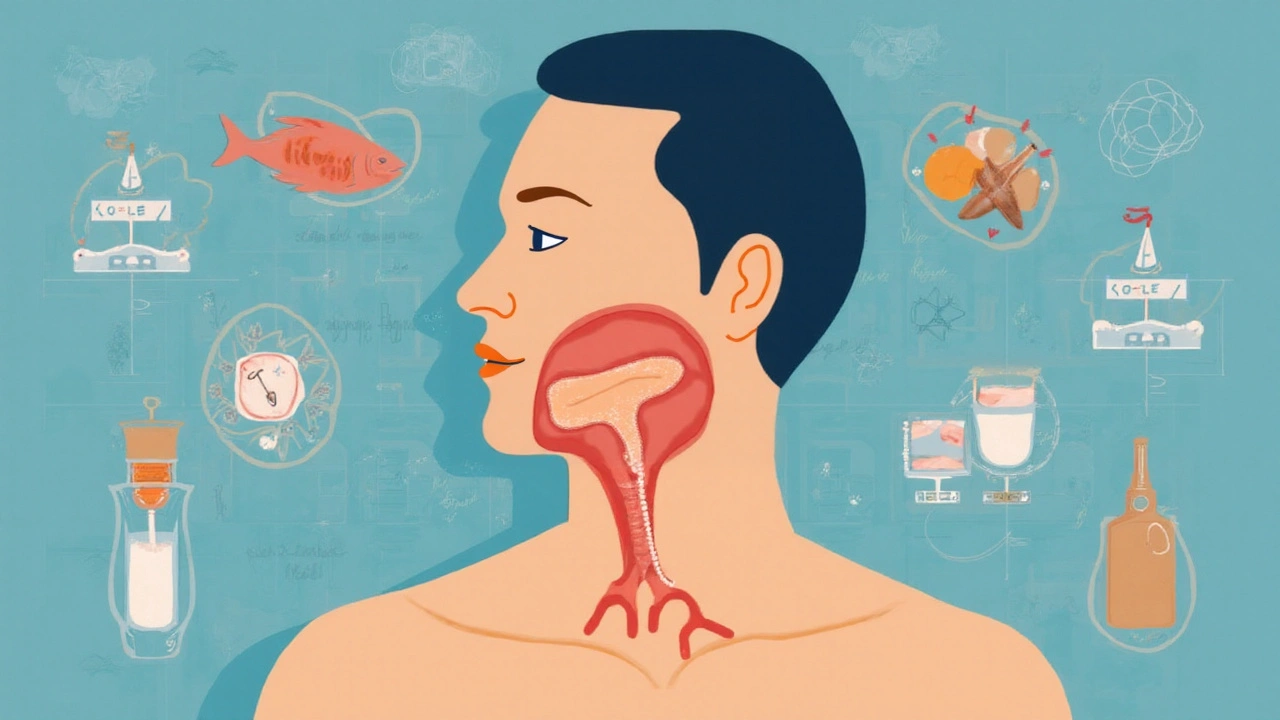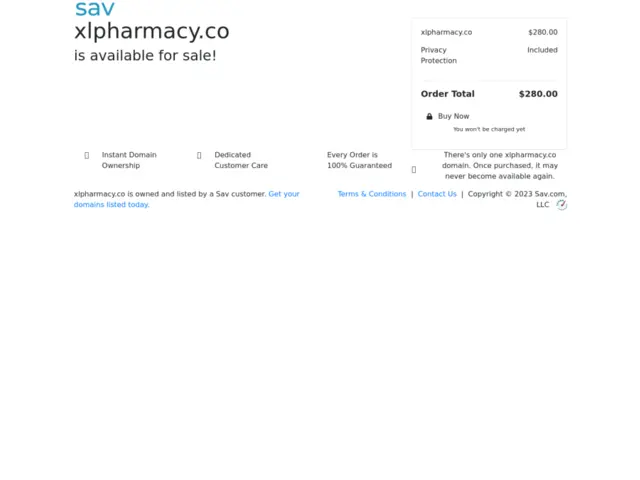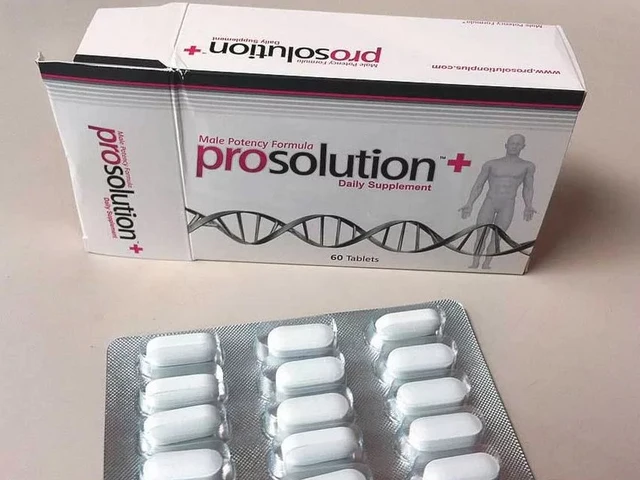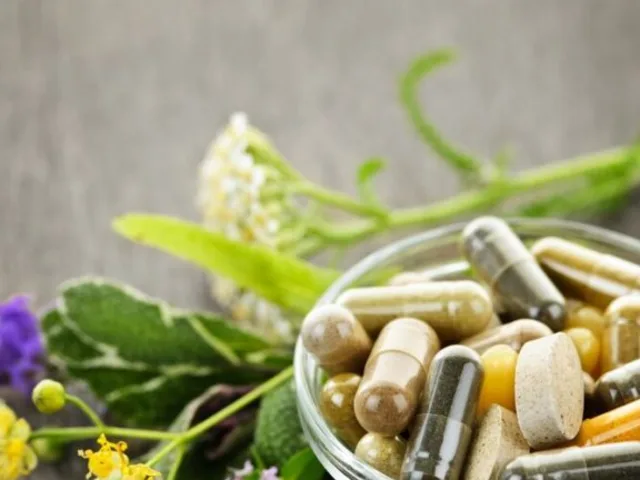If you’ve ever stared at your tiny levothyroxine pill and wondered, “Could I swap this prescription for more broccoli or a handful of Brazil nuts?” you’re not alone. The idea of ditching meds for natural fixes is pretty tempting, especially when you hear that some nutrients can actually fire up thyroid function. But is this just wishful thinking or does real science back it up? Let’s get honest — your thyroid health depends on more than just hope and herbal teas.
How Thyroid Hormones Work — And Where Diet Fits In
Your thyroid runs the show for your metabolism, energy levels, and even mood swings. When your body slacks on making thyroid hormone (usually called hypothyroidism), your doctor often reaches for levothyroxine — a synthetic version that's supposed to step in seamlessly. But here’s the shocker: your thyroid can’t work its magic without raw materials from your meals. Iodine and selenium? They’re not extras. Without them, the whole hormone system falls flat.
Iodine grabs the spotlight first. It’s basically the ingredient in every thyroid hormone molecule, whether that’s T4 (levothyroxine) or T3, which is the stronger ‘active’ form. You get iodine from the sea — think fish, seaweed, and some dairy because cows’ feed is usually iodized. Mild deficiency is rare in many countries, thanks to iodized salt, but cutting it out for a “natural” or low-sodium diet can backfire. Some fans of plant-based eating or specialty diets slip into low-iodine territory without realizing it. According to the American Thyroid Association, adults need about 150 micrograms daily. Pregnant? You need even more — up to 220 to 290 micrograms — because growing babies absolutely depend on it. Skip that, and thyroid problems can sneak up fast, affecting both mom and baby.
Selenium is the unsung hero. It’s not in thyroid hormone itself, but it helps convert T4 (what your doctor prescribes) into T3 (what actually does the work). Without selenium, your body can pile up plenty of T4, but you might not feel much benefit. The best natural source? A single Brazil nut can tip you over the daily need for selenium, which is set at just 55 micrograms for adults. But it’s a Goldilocks situation — too much is toxic, too little means sluggish thyroid function or even mood disturbances. Who knew a few nuts could make or break your energy levels?
Zinc and iron sneak into the conversation too. Zinc helps with the conversion process, and iron helps your thyroid put iodine to good use. Skipping on these — especially if you’re dealing with heavy periods, vegetarian diets, or gut absorption issues — can leave your thyroid sputtering, even if you’re getting “enough” iodine and selenium.
Here’s where it gets tricky: The science says these nutrients help your thyroid only if you’re actually deficient. For most people with full-blown hypothyroidism (where the gland is destroyed, removed, or barely works), shoveling more nutrients onto your salad won’t replace what the gland can’t do. A Journal of Clinical Endocrinology & Metabolism review from 2023 found that unless you’re in a developing region with genuine deficiencies, simply adding more iodine or selenium to your already-balanced diet probably won’t ditch your need for levothyroxine. It might even throw your hormones off balance if you overdo it. This is where people fall for the “natural solves everything” trap, only to wind up right back in the endocrinology office.
One interesting angle: Some people with subclinical (mild) hypothyroidism have improved lab results when they fix their iodine or selenium levels, but those studies don’t show an all-clear to skip medication. The best boost you can give your thyroid through food happens when you fix a real shortfall, not just by piling on supplements “just in case.”

The Science of Swapping Pills for Provisions: What the Studies Reveal
This is where the debate heats up. Tons of headlines promise “cure your thyroid with kale and kelp,” but actual research draws some sharp lines. If your thyroid works fine — or you’ve got mild sluggishness triggered by low nutrients — a smart shift in your diet can make a world of difference. But if your thyroid’s basically tapped out, cells destroyed by autoimmune attack (like Hashimoto's), or it’s been surgically removed, nutrients alone can’t reboot the engine.
For mild cases, like borderline low thyroid hormones (called subclinical hypothyroidism), a 2022 randomized trial in the British Journal of Nutrition found that increasing iodine and selenium in folks with documented deficiencies brought thyroid levels back to normal — but only when their diets had been genuinely low in those minerals. For everyone else? Adding more did nothing for their TSH scores or symptoms. Your thyroid gland still needs to be “alive” to use those nutrients. Makes sense, right?
Another twist: High iodine intake — especially from overdoing seaweed or supplements — can actually worsen thyroid function. Populations in Japan and South Korea, where kelp broth is a staple, show higher rates of thyroid autoimmunity when daily intake passes 1100 micrograms. So don’t chase seaweed shakes thinking, 'more is better.'
Selenium acts more like a Goldilocks mineral. Enough can help, but extra can tip the scale the wrong way. Double-blind studies in Europe gave folks with Hashimoto’s thyroiditis high selenium doses and, yes, saw mild drops in thyroid antibodies but no consistent changes in how patients felt — no boost in energy, weight control, or mood. The practical upshot: if you’re not low, supplements do little and could harm you.
A 2024 review from the Endocrine Society highlights that the best-supported diet for thyroid health is just a balanced, varied one. Get nutrients from food — seafood for iodine, Brazil nuts for selenium, red meat, beans, or fortified cereals for iron and zinc. Exotic “thyroid healing diets” from social media don’t outperform basic good nutrition. Ironically, extreme cleanses and fad diets often risk making deficiencies worse.
Something else not often discussed: Digestive health plays a role too. Gut issues like celiac disease, Crohn’s, or even chronic inflammation can mess with nutrient absorption, sometimes creating thyroid problems that don’t go away until you treat the gut itself. If you’re tired and cold all the time but eat a dream diet, it’s worth checking for hidden absorption issues before chasing more supplements.
Medications and coffee can even block how well your body absorbs levothyroxine. That’s why doctors say take your pill on an empty stomach, with nothing but water, and wait at least 30 to 60 minutes before breakfast or coffee. Some people swear by splitting their dose or timing it to avoid dairy, calcium, or iron-rich foods, since those nutrients can snag the medication before it hits your bloodstream.
Now, let's be fair: Alternative and natural remedies pop up every year. Some folks look for a natural substitute for Synthroid or levothyroxine, hoping a herbal blend or bioidentical option will give the same effect without the synthetic label. Some of these, like desiccated thyroid from pigs, do have both T4 and T3, and a small group feels better on them. But regulated dosing remains a nightmare — those pills can vary wildly in potency, and no major guideline says they’re safer or better than levothyroxine for most people. Always talk it through with your endocrinologist before switching. There’s no universal ‘hack’ to replace your prescription, but knowing the facts gives you actual control, not just another internet myth.

Real-World Tips: Eating for Thyroid Support Without Ditching Meds
So where does all this science leave you if you want to do something useful for your thyroid — whether you take levothyroxine or just want to keep your levels on track? Forget magic foods. The big wins come from small, steady habits.
Start with common sense: Don’t drop iodized salt unless there’s a medical reason. Himalayan or fancy sea salts may look beautiful, but most have little to no iodine. Unless you eat lots of ocean fish, seaweed, and dairy, that sprinkle of iodized table salt on your eggs actually matters. People who cut it out chasing 'clean' eating routines sometimes regret it when fatigue or brain fog settles in.
Mix up your protein sources. Seafood packs not just iodine but also selenium and healthy omega-3s. Swap in a serving or two of fatty fish like salmon, sardines, or trout every week. If you’re vegetarian, lean into beans, lentils, low-fat dairy, and eggs. Just skipping meat doesn't have to put your thyroid on the back foot as long as you keep those balances right.
Think about your daily selenium too. Brazil nuts are the gold standard — but stick to just one or two a day. It’s shockingly easy to overdose (a handful can blow past safe limits). Other good sources include tuna, sardines, turkey, and sunflower seeds. Rotate them through your diet instead of relying on supplements.
Go easy on raw cruciferous veggies like kale, broccoli, and cabbage if you have a known thyroid issue. In huge amounts (like drinking raw kale smoothies by the jugful), they may interfere with how your gland uses iodine. Cooked, these are rarely an issue, and the benefits of fiber, vitamins, and cancer-fighting compounds far outweigh tiny risks for most folks.
Keep an eye on iron and vitamin D. Low ferritin (your body’s storage form of iron) is surprisingly common, especially among menstruating women or those who’ve given blood recently. If you’re diagnosed with hypothyroidism but iron runs low, topping that up can sometimes help symptoms improve faster alongside levothyroxine.
If you’re managing side effects or think your medication isn’t ‘working’ as well as it should, check timing and what else you take with it. Even a vitamin pill or your morning granola’s calcium content could be messing with absorption. Your pharmacist can help you time doses right to make every microgram count.
Don’t dive into supplements without knowing your actual levels. Most people get enough iodine and selenium without extra pills, but some medical conditions, diets, or regional soil differences can leave you short. A quick blood test can save you from both scary deficiencies and dangerous overdoses. Trust that lab slip more than TikTok’s latest wellness hack.
If you want to explore more about real alternatives, or even what a natural substitute for Synthroid could look like, check out resources and consult reliable sites. Just remember, there’s no shortcut that can fully replace what your missing thyroid can’t make — but dialing in your food choices, lab testing, and medication timing can turn the odds in your favor. That’s not wishful thinking; it’s just good science.





Shelley Beneteau - 14 August 2025
Levothyroxine isn’t something to mess with, and the post nails why food can help but rarely replace it.
I fixed my timing first: always on an empty stomach and I wait a solid 45 minutes before breakfast. That one change made lab numbers more stable than any trendy supplement ever did.
Also, adding a couple of Brazil nuts once a week and eating fish twice weekly helped my energy without touching my prescription dose. Small, targeted diet tweaks are practical and actually safe.
One more practical note, iron levels were low for me for years, and once I corrected that alongside my meds I stopped feeling like I was moving through molasses. It’s not sexy, but it works.
Delilah Allen - 14 August 2025
Don’t overdo the seaweed craze!!!
People go crazy thinking more is better and then bam - autoimmune flare or worse thyroid suppression. Seriously, stick to recommended amounts, not smoothie-stuffing a whole sheet of kelp every day.
Supplements are not candy. Read labels. Watch selenium dosing. One Brazil nut can be enough for a day. Take that seriously.
Timing your pill and watching interactions is the real low-effort win here.
Nancy Lee Bush - 16 August 2025
I switched to tracking my iodine and selenium intake after a blood panel showed slight deficiencies, and the change was noticeable pretty fast :).
Food first was my rule - fish, dairy, eggs, legumes - and I only used supplements when labs said so. That kept me from overdoing things and feeling worse.
The weird part was realizing gut health mattered more than I thought, because once I fixed a mild absorption issue my thyroid numbers stabilized even more.
Dan Worona - 17 August 2025
Big pharma narrative is loud, but there’s also real nuance here.
Pharma pushes meds, wellness influencers push food as cure-alls, and most people get stuck in the middle. Some clinics make bank off unnecessary med changes; others will refuse to consider dietary fixes at all. The truth sits between those extremes: meds for people who need them, diet for people with fixable deficiencies, and both when absorption or autoimmune issues complicate things.
Watch for interactions and for clinicians who only offer one-size-fits-all advice. Be skeptical of extremes on both sides. Do the labs. Keep receipts. Stay observant.
Alyssa Matarum - 18 August 2025
Nice concise advice: labs first, then food, then supplements as needed. Short and sweet.
Lydia Conier - 19 August 2025
I had a messy transition once when I tried stopping meds because I thought eating 'better' was the same as replacing hormones. That was a mistake.
My energy crashed, my mood tanked, and it took months and a lot of apologies to my doc to sort the rebound. I eventually got proper blood tests, found a low ferritin number, corrected that, adjusted timing of my levothyroxine, and then slowly optimized diet to support the thyroid.
Fix the basics first: don’t assume supplements are harmless. They aren’t. And if your gut is off, foods won’t absorb properly - so get that checked too.
Also, tiny tip: don’t mix your pill with coffee or calcium heavy breakfasts. It kills absorption more than people realize.
ruth purizaca - 20 August 2025
Noted.
Sonya Postnikova - 21 August 2025
There’s a lot to unpack here, so here’s a practical roadmap I use with the people I mentor.
Step one: baseline blood work. Full panel, not just TSH. Check free T4, free T3, TPO antibodies, selenium, iodine markers when relevant, ferritin, vitamin D, and basic nutrients that affect thyroid function. Labs give you a map, not a magic fix.
Step two: medication timing and absorption. Levothyroxine is fickle. Take it consistently on an empty stomach, separate from calcium, iron, or high-fiber meals, and keep the routine stable. That consistency makes labs interpretable and prevents wild swings in symptoms.
Step three: fix deficiencies from food where you can. Seafood, eggs, dairy, legumes, and just one or two Brazil nuts weekly can stabilize selenium and iodine for most people. Rotate sources to avoid excess.
Step four: treat malabsorption when present. If someone has celiac, IBD, or chronic IBS, work with a gastroenterologist. Food alone won’t cut it until absorption improves.
Step five: avoid extremes. Don’t binge on kelp. Don’t self-prescribe high-dose selenium. The boundary between helpful and harmful is thinner than people think.
Step six: if autoimmune markers are high, work on systemic inflammation. Balanced diet, sleep, stress management, and targeted medical care matter more than any single 'thyroid' supplement.
Final step: regular follow-up. Recheck labs after dietary or med changes and adjust together with your clinician. That’s how you actually move the needle safely.
Anna Zawierucha - 23 August 2025
Lovely how everyone suddenly remembers basic nutrition when convenience fails them.
Food is wonderful, yes, but it isn’t a potion that reverses organ failure. People want a glamorous fix; they deserve straightforward science instead.
Sensible diet, measured supplements when needed, and respect for actual endocrinology beats fad advice every time. That’s a little boring, but it works.
Mary Akerstrom - 24 August 2025
Keeping it practical helps a lot; I started a simple tracker to note when I took my pill and what I ate, and within weeks my follow-up labs were cleaner.
Small habits add up: consistent timing, a couple of selenium-rich snacks a week, and being mindful about iron intake during heavy cycles made the biggest difference for me.
Also, gentle reminder to people recovering from surgical thyroid removal: replacements are lifesavers and you still benefit from good nutrition for overall health.
Shelley Beneteau - 25 August 2025
Quick follow-up from my earlier point about timing - I learned the hard way that calcium-enriched cereals and my med are enemies.
Swapping cereals for oatmeal after labs stabilized made mornings less chaotic and my TSH dropped into range more consistently. It’s the little scheduling things that add up.
Also, I keep a single Brazil nut on the counter as a daily reminder to not overdo supplements. One humble nut, not a jar of pills, keeps me sane.
Delilah Allen - 26 August 2025
Exactly. Stick to the basics and stop chasing every new 'miracle' from influencers. Patience and consistency win.
And a friendly shove to those eyeing desiccated thyroid without real guidance: dosing varies wildly, and that unpredictability can be dangerous. Talk to a specialist and keep records of labs before any switch.
Seth Angel Chi - 14 August 2025
Iodine and selenium are supportive but they will not resurrect a gone thyroid.
For people with functioning thyroid tissue, fixing a real deficiency often improves labs and symptoms, and that matters. If the gland is destroyed by autoimmune disease or removed, those nutrients can't replace hormone production. Timing of levothyroxine is essential and often overlooked - take it on an empty stomach and keep calcium, iron and coffee away for a while. Small diet changes are useful as adjuncts, not as substitutes. Be careful with supplements because more is not always better and minerals like selenium have a narrow safe range. Practical approach is to check labs, correct deficiencies from food first, and only then consider targeted supplementation under a clinician's guidance.
William Dizon - 14 August 2025
Good point about timing and absorption, worth repeating and emphasizing.
Levothyroxine absorption drops if you take it with anything other than water, and even grapefruit or coffee can blunt the effect. Splitting doses or switching to bedtime dosing helps some people but should be done based on TSH checks, not vibes. If iron or calcium supplements are needed, schedule them several hours apart. Pharmacists can give exact timing and interactions that save you a lot of frustration.
vijay sainath - 14 August 2025
People act like a kelp smoothie will cancel a prescription and that is reckless.
Overdoing iodine is a ticket to trouble in many places, and miracle supplement sellers prey on the desperate. Fixing real nutritional gaps is sensible. Chasing extremes on social feeds is not.
Daisy canales - 14 August 2025
I stick to my dose and add a Brazil nut daily.
Alice L - 14 August 2025
I follow the evidence and it is clear that nutrients are supportive but not curative for most cases of hypothyroidism.
Iodine is essential and deficiency must be corrected as a matter of public health and individual care. Pregnancy requires higher intake and this is non-negotiable when planning care for pregnant patients. Selenium facilitates T4 to T3 conversion and there is modest data supporting antibody reduction in autoimmune thyroiditis. However, reductions in antibodies do not consistently translate to symptomatic improvement or reduced medication needs. The heterogeneity of trials, variations in baseline nutrient status, and small sample sizes limit the generalisability of many findings. High iodine intake from supplements or concentrated seaweeds can precipitate or worsen autoimmune thyroid disease and must be avoided in excess. Desiccated thyroid preparations contain both T4 and T3 and some patients report subjective improvement when using them. Despite this, variability in potency and lack of consistent regulatory oversight mean that substitution should be undertaken with caution and under specialist supervision. Gut pathology that impairs absorption of iron and other micronutrients can produce secondary effects on thyroid function and symptomatology. A careful clinical assessment should therefore include evaluation of dietary intake, gastrointestinal health, and medication timing. Levothyroxine remains the standard of care because it provides a predictable dose of T4 which peripheral tissues convert as required in most patients. Clinicians must tailor therapy, individualise dosing, and monitor with laboratory tests rather than rely on unverified natural cures. Public guidance should emphasise balanced diets, avoid extremes, and encourage use of tested interventions when deficiencies are documented. This nuanced approach combines nutritional adequacy with evidence-based pharmacotherapy to achieve the best outcomes for patients.
Kristen Ariies - 14 August 2025
Yes yes yes to lab testing first and not jumping on supplements like candy.
Correcting deficiencies can feel empowering and it often reduces anxiety about health. Keep portions sensible, rotate sources of selenium and iodine rather than bingeing on one food, and coordinate with your provider before changing meds or doses. Small, steady habits beat drastic detoxes every time!!!
Ira Bliss - 14 August 2025
Food first, tests second, pills as needed 😊
Seafood, dairy, and a single Brazil nut go a long way to cover basic needs. Watch for gut issues that hide deficiencies and make supplements pointless. Labs will tell the real story, not influencers.
Donny Bryant - 14 August 2025
Practical note on iron and ferritin.
Low ferritin is more common than people think and it blunts thyroid recovery. If ferritin is low, topping it up alongside levothyroxine often improves symptoms faster than adjusting thyroid dose alone. Women with heavy periods, vegetarians, and frequent blood donors should especially watch this. Also remember vitamin D and overall protein intake, they matter too.
Jenae Bauer - 14 August 2025
They tell you to trust labs and clinicians and that sounds safe until you dig a little deeper into who funds the research.
There are patterns where big supplement companies and drug makers both steer narratives for profit and people get stuck in cycles of testing and retesting. Sometimes traditional remedies work and get dismissed because they are outside of the mainstream. I am not saying to ignore evidence, only that outcomes vary and the system has incentives that don't always align with individual healing. The internet noise makes simple acts like eating seaweed suddenly suspect or miraculous depending on the day. People deserve informed consent and transparency, not a one-size-fits-all script. Keep skepticism, but pair it with data and careful monitoring so nobody gets hurt.
keyul prajapati - 14 August 2025
I grew up in a region where soils are iodine-poor and I have seen community goiters disappear after iodization programs.
Individual experiences vary greatly and population data cannot be ignored when discussing nutrition and thyroid health. Some people will respond dramatically to nutrient correction and regain normal lab values without ever needing long-term replacement therapy. Others have autoimmune destruction and no amount of dietary adjustment will regenerate thyroid tissue. The trick is recognising which bucket a patient falls into by using objective tests. I read widely and also talk to clinicians who manage these cases and the consensus is pragmatic rather than ideological. Food-first approaches are sensible for prevention and mild insufficiency but therapeutic hormone replacement is required for overt hypothyroidism. Timing of levothyroxine is underrated because many patients take it with breakfast and report persistent symptoms due to reduced absorption. Calcium supplements, iron tablets, and even certain fiber-rich cereals can interfere with the drug if co-administered. The internet sells miracle kelp pills and promises but these are a marketing problem more than a medical solution. Testing before supplementing is cost effective given the narrow therapeutic window of minerals like selenium that can be toxic at high doses. When clinicians monitor TSH and free thyroxine accurately and adjust doses, most patients do very well on levothyroxine with improved energy and mood. Alternative preparations attract vocal proponents but controlled data rarely shows superiority and often raises safety concerns. Community health initiatives like fortifying salt with iodine have historical precedent and measurable benefit without individual-level risks when monitored. My long-winded point is that evidence and context matter and that both diet and medicine have roles in thyroid care, but they are not interchangeable in most clinical scenarios.
William Dizon - 14 August 2025
Agree, context matters and population programs have real impact.
But for an individual in clinic, the practical steps are simple: check labs, correct deficiencies, watch interactions, and adjust medication based on TSH and symptoms. That process works reliably when followed consistently.
Kristen Ariies - 14 August 2025
Exactly, simple steps repeated consistently win the day!
Small changes, consistent testing, and clear communication with your provider lead to better outcomes and less panic. Keep it steady and celebrate small wins along the way!
Seth Angel Chi - 14 August 2025
Final quick practical note on supplements and safety.
Do not assume 'natural' equals safe, especially with minerals. Check baseline levels, correct deficits gradually from food where possible, and use targeted supplements only when labs show need. Work with your clinician to monitor TSH and symptoms during any change so you avoid surprising swings. Small, evidence-aligned steps beat dramatic, untested regimens.
Daisy canales - 14 August 2025
Simple routine and limits work for me and keep stress low.
Less drama, more steady choices, that is how I keep energy up while staying on meds.